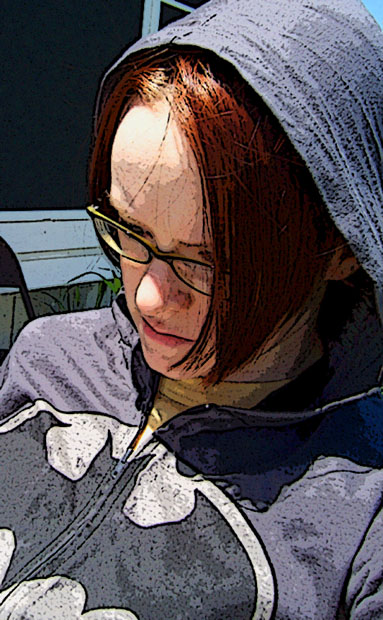Group 6, Issue Category F
"Transforming the Library Structure"
what struck you as key or most exciting?
- user focus
- "real time"
- convenience is important
- idea of opening the closed circle
- sense of urgency
- valuing librarians as professionals
- complaining attitudes need to change
- how patronizing we are toward are constituents
- concept of the zone of mediocrity
- people are starving for time
- libraries as idea labs
- the front door experience--what you see when you first come in
- change in the balance of time and resources
already doing:
- Christina's library puts staff on the desk--tiered system
-- reevaluated how she felt about it
-- been using the "on-call" model for awhile; physical and virtual reference
-- librarians do use the chat services for a few hours a day
-- librarians on-call that are called will move the question away from the desk to answer it
-- if they can't answer it, then they move to a subject specialist--but that's not very often
-- problems sometimes--staff people don't know when to let go of a question
-- new librarians do need to have desk time to gain experience with answering questions
-- some librarians are not willing to give up the traditional reference model, and don't have initiative to go out and do outreach, pro development--you need to carefully repurpose them
- think of it as "triage"
-- take care of urgent, easy questions at point of need (shelvers and directional questions)
- but what if "i need this book" wasn't the real question--reference interview may be missed
- look at potential outcomes: can repuporse the professionals so that they can focus on the big showy issues, questions, services
- on the other hand, the staff that are repurposed may feel more meaningful and have more variety; lends toward retention
- another element; we need to level with our users; let them define what they want/need
- are we patronizing staff by saying "train them to be me"
- not everyone has to be an expert--not every situation requires it
- former sales manager -- sales call focus on satisfying the user's need
- using librarian's knowledge and skills to help users be self-reliant
- "let me take you to a pro" (a value-added statement)
- participatory engagement --not all one-sided
- get away from the defensiveness of being professionals
- create a system that's intuitive that users don't need classifications numbers anymore -- the whole idea of designing anything in the catalog is to get the info, not to get the system to users -- goal is to get what they want, not to teach them a system
- web 2.0 users creating own subject tags--that's part of it, but it's a whole philosophy; natural-language searching, etc.
- "bookstore signage" for subjects above the LC numbers, to enable browsing
- librarians as a culture tend to be introverted; they aren't greeting people or smiling even when encouraged to. it's partly the people our profession attracts.
- measures: show our value to the community; we need to look at the real values that we add to the community. School: better grades, passing, academic libraries: learning outcomes, public libraries: help to the community. Substantive measure, not just "feelgood" measures like "do you like your library." Dollars are the direct measure; surveys are indirect.
- ROI calculators on your library's webpage. (Dynamic ROI on page?) ROI isn't outcome.
- it's not always easy to locate a book in a bookstore, either--how is the book categorized?
- engaging community -- step out more -- have a flickr account and engage community to tag the photos; people who were present for historical photos add their information to them;
-- collaboration between community libraries and librarians; denton reads formed collaboration that lead to public library depository interactions; utilize different missions/collections.; need formal ways to collaborate
-- "staff share" between different libraries to give new perspective
-- learn about our communities!!!! ****
- motto: "we are all the library" -- community
- grade yourself on your outreach
- what are we doing in collaboration? What's the purpose and impact? measure the outcome and success--does something concrete come as a result?
- (university president) why do your libraries want and need to change? what is it that's compelling us to change? ideas are great, but you can't change the individual, can you? you need to get the leadership involved--it's consequences that get people to change.
-- relevance and survival. faculty change how and what they teach/research, and it's the same for libraries.
-- mission -- serve our users
- territorial: we say "at YOUR library," but we mean at "our library" -- how can we truly make the library *theirs*
- how are you going to convince the masses? as in, other librarians? repeat this session/training/etc. in your home library to inspire them.
-- how are we going to get the users to take the survey?
action item:
- get away from the idea that we are the information specialists, if we agree with what the speakers said.
- know what is expected of us. your constituency may tell you something that you don't want to hear--you need to be prepared for that.
- decide we want to change.
- define what we are now and what we want changed.
- define our value from the user's point of view.
- come up with a survey format to survey users, for all libraries. we have OCLC for the bigger picture, but we also need a local survey. feedback, specific community information.
-- create different options or models for ways to accomplish change.
-- #1 is define your constituency.
- develop a triage of staff to handle user needs
- enable independent library users. change to -- develop a library that can be used independently. don't ignore the higher-level user groups, though.
- increased collaboration.
- increased outreach.
-- training/materials to help other libraries do outreach and collaborations. they need to cross library-type barriers.
-- texas-wide or other large-scale public media statement of "this is who we are and what we do"
question:
how do we change ourselves in order to transform our libraries?
what does "ourselves" mean? what part of us do we need to change?
- don't see constituents as active, savvy info searchers -- back up and let them try the search themselves
- give an understanding that we're not special, separate, or first -- we need to provide good customer service
-- "what would i do to make myself come into the library?" find out how they want to be treated. account for different users and generations.
- look at what our users need; think like the user
- go to a library that isn't yours to get that feeling
- there isn't a one-size-fits all
- define what makes a good library by what a constituent thinks makes a new library -- create the appropriate measures for each library (differ by type, maybe by individual libraries)
-- there are some quantifiable measures, but we also need valid user opinion surveys
-- perception of us by our entire community, whether they use us or not
- change by becoming part of the bigger, non-library community, learning what they need and expect and want and use
- year after year, committing to reinventing yourself
-- you can't predict, but be flexible and regularly reassess
- idea of the generation gap or different personalities (changers vs non-changers) -- can we bridge the gap to show that people inherently are more alike than that
-- another instance of where we need to stop generalizing
- there's some dis-ease that we're not providing service that we need to provide -- that's an institution by its nature wants to continue itself (short term = not changing), but long-term means you have to change; an institutional momentum toward not changing
Subscribe to:
Post Comments (Atom)



No comments:
Post a Comment